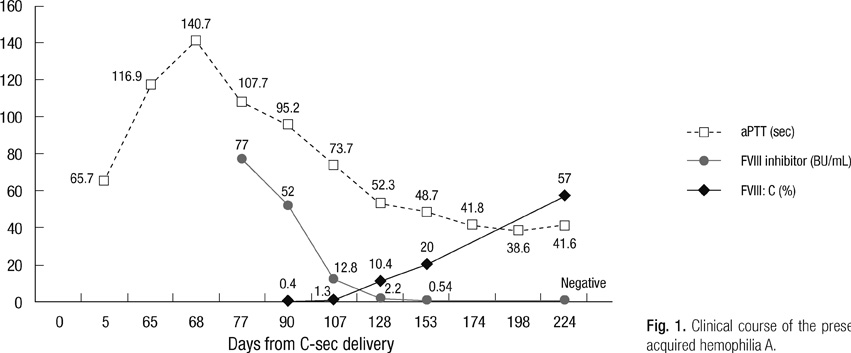J Korean Med Sci.
2011 Sep;26(9):1247-1249. 10.3346/jkms.2011.26.9.1247.
The First Case of Postpartum Acquired Hemophilia A in Korea
- Affiliations
-
- 1Department of Laboratory Medicine & Genetics, Samsung Medical Center, Sungkyunkwan University School of Medicine, Seoul, Korea. heejinkim@skku.edu
- 2Department of Medicine, Samsung Medical Center, Sungkyunkwan University School of Medicine, Seoul, Korea.
- 3Korea Hemophilia Foundation, Seoul, Korea.
- KMID: 1779404
- DOI: http://doi.org/10.3346/jkms.2011.26.9.1247
Abstract
- Acquired hemophilia A (AHA) is a rare coagulopathy caused by autoantibodies to coagulation factor VIII (FVIII). Most patients with AHA have been previously healthy; however, a variety of morbidities have been associated with the condition including pregnancy. A 40-yr-old woman visited our institution with extensive hematoma on the right hip area. Her medical history revealed no personal or familial history of bleeding diathesis. Her coagulation tests showed markedly prolonged aPTT (117 sec), markedly decreased level of FVIII activity (0.4%) and high-titer FVIII inhibitor (77 BU). Collectively, she was diagnosed as having postpartum AHA and was treated with bypassing agents and corticosteroids. Her aPTT was normalized on the 174th postpartum day and FVIII inhibitor showed negative conversion on the 224th postpartum day. This is the first case of postpartum AHA with high-titer FVIII inhibitor in Korea. Timely diagnosis and management can reduce morbidity and mortality of this potentially life-threatening condition.
MeSH Terms
-
Adrenal Cortex Hormones/therapeutic use
Adult
Autoantibodies/blood
Blood Coagulation Factors/therapeutic use
Factor VIII/immunology
Factor VIIa/therapeutic use
Female
Hematoma/diagnosis
Hemophilia A/*diagnosis/therapy
Humans
Partial Thromboplastin Time
Postpartum Period
Pregnancy
Recombinant Proteins/therapeutic use
Republic of Korea
Figure
Cited by 1 articles
-
Second case of postpartum acquired hemophilia A in a Korean female
Kun Soo Lee, Ye Jee Shim, Kyoung Mi Jang, Shin Young Hyun
Blood Res. 2014;49(3):205-207. doi: 10.5045/br.2014.49.3.205.
Reference
-
1. Boggio LN, Green D. Acquired hemophilia. Rev Clin Exp Hematol. 2001. 5:389–404.2. Franchini M. Postpartum acquired factor VIII inhibitors. Am J Hematol. 2006. 81:768–773.3. Lottenberg R, Kentro TB, Kitchens CS. Acquired hemophilia. A natural history study of 16 patients with factor VIII inhibitors receiving little or no therapy. Arch Intern Med. 1987. 147:1077–1081.4. Franchini M, Targher G, Montagnana M, Lippi G. Laboratory, clinical and therapeutic aspects of acquired hemophilia A. Clin Chim Acta. 2008. 395:14–18.5. Hauser I, Schneider B, Lechner K. Post-partum factor VIII inhibitors. A review of the literature with special reference to the value of steroid and immunosuppressive treatment. Thromb Haemost. 1995. 73:1–5.6. Franchini M. Haemostasis and pregnancy. Thromb Haemost. 2006. 95:401–413.7. Oldenburg J, Pavlova A. Genetic risk factors for inhibitors to factors VIII and IX. Haemophilia. 2006. 12:Suppl 6. 15–22.8. Tripodi A, Mancuso ME, Chantarangkul V, Clerici M, Bader R, Meroni PL, Santagostino E, Mannucci PM. Lupus anticoagulants and their relationship with the inhibitors against coagulation factor VIII: considerations on the differentiation between the 2 circulating anticoagulants. Clin Chem. 2005. 51:1883–1885.9. Shobeiri SA, West EC, Kahn MJ, Nolan TE. Postpartum acquired hemophilia (factor VIII inhibitors): a case report and review of the literature. Obstet Gynecol Surv. 2000. 55:729–737.10. Kasakura S. A factor in maternal plasma during pregnancy that suppresses the reactivity of mixed leukocyte cultures. J Immunol. 1971. 107:1296–1301.11. Coller BS, Hultin MB, Hoyer LW, Miller F, Dobbs JV, Dosik MH, Berger ER. Normal pregnancy in a patient with a prior postpartum factor VIII inhibitor: with observations on pathogenesis and prognosis. Blood. 1981. 58:619–624.12. Green D, Lechner K. A survey of 215 non-hemophilic patients with inhibitors to Factor VIII. Thromb Haemost. 1981. 45:200–203.13. Tagariello G, Sartori R, Radossi P, Gandini G, Franchini M. Intensive blood transfusion support in acquired hemophilia A. Ann Hematol. 2007. 86:229–230.14. Cohen AJ, Kessler CM. Acquired inhibitors. Baillieres Clin Haematol. 1996. 9:331–354.15. Hedner U, Erhardtsen E. Potential role for rFVIIa in transfusion medicine. Transfusion. 2002. 42:114–124.16. Onitilo AA, Skorupa A, Lal A, Ronish E, Mercier RJ, Islam R, Lazarchick J. Rituximab in the treatment of acquired factor VIII inhibitors. Thromb Haemost. 2006. 96:84–87.17. Wiestner A, Cho HJ, Asch AS, Michelis MA, Zeller JA, Peerschke EI, Weksler BB, Schechter GP. Rituximab in the treatment of acquired factor VIII inhibitors. Blood. 2002. 100:3426–3428.18. Jansen M, Schmaldienst S, Banyai S, Quehenberger P, Pabinger I, Derfler K, Hörl WH, Knöbl P. Treatment of coagulation inhibitors with extracorporeal immunoadsorption (Ig-Therasorb). Br J Haematol. 2001. 112:91–97.19. Kim MS, Kilgore PE, Kang JS, Kim SY, Lee DY, Kim JS, Hwang PH. Transient acquired hemophilia associated with Mycoplasma pneumoniae pneumonia. J Korean Med Sci. 2008. 23:138–141.20. Kim HJ, Lee WS, Lee YJ, Jun HS, Seo SK, Joo YD. Acquired factor VIII deficiency after consuming the dried gallbladder of a cobra, Naja naja. Korean J Hematol. 2010. 45:205–207.
- Full Text Links
- Actions
-
Cited
- CITED
-
- Close
- Share
- Similar articles
-
- A case of acquired hemophilia detected after influenza vaccination
- Second case of postpartum acquired hemophilia A in a Korean female
- Total Knee Arthroplasty-associated Acquired Hemophilia: A Case Report
- Two Cases of Acquired Hemophilia A Successfully Treated with Oral Steroid or Danazol
- Acquired Hemophilia in a Patient Presenting with Swollen Left Limb


